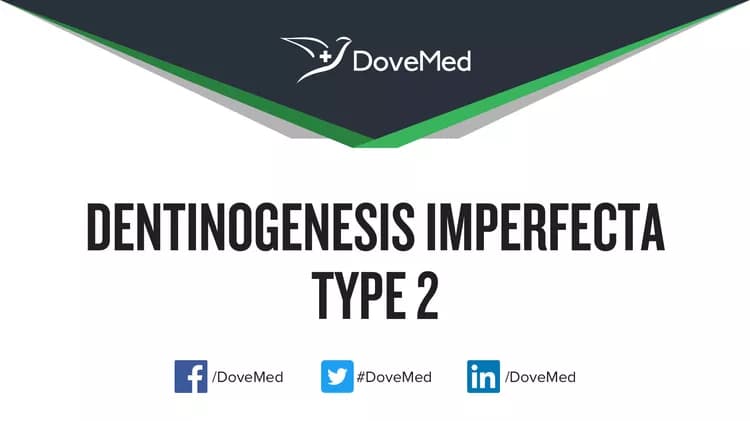What are the other Names for this Condition? (Also known as/Synonyms)
- Capdepont Teeth
- Dentinogenesis Imperfecta, Shields type 2
- DGI-2 (Dentinogenesis Imperfecta Type 2)
What is Dentinogenesis Imperfecta Type 2? (Definition/Background Information)
- Dentinogenesis Imperfecta Type 2 (DGI-2 or DI-2) is a rare and severe form of dentinogenesis imperfecta, a condition that affects tooth development
- People affected by the condition may have weak and discolored teeth. These problems can affect both primary (baby) teeth and permanent teeth
- People with this form of dentinogenesis imperfecta have no normal teeth. Sensorineural hearing loss has also been found in some affected people
- Dentinogenesis Imperfecta Type 2 is caused by changes (mutations) in the DSPP gene and is inherited in an autosomal dominant manner
- Treatment is usually focused on protecting primary (baby) and then permanent teeth with preformed pediatric crowns and other interventions. The replacement of teeth might be considered in the future with dentures and/or implants
(Source: Dentinogenesis Imperfecta Type 2; Genetic and Rare Disease Information Center (GARD) of National Center for Advancing Translational Science (NCATS), USA.)
Who gets Dentinogenesis Imperfecta Type 2? (Age and Sex Distribution)
- Dentinogenesis Imperfecta Type 2 is a rare congenital disorder. The presentation of symptoms may occur when a baby develops milk teeth
- Both males and females may be affected
- Worldwide, individuals of all racial and ethnic groups may be affected
What are the Risk Factors for Dentinogenesis Imperfecta Type 2? (Predisposing Factors)
- A positive family history may be an important risk factor, since Dentinogenesis Imperfecta Type 2 can be inherited
- Currently, no other risk factors have been clearly identified for DGI-2
It is important to note that having a risk factor does not mean that one will get the condition. A risk factor increases one’s chances of getting a condition compared to an individual without the risk factors. Some risk factors are more important than others.
Also, not having a risk factor does not mean that an individual will not get the condition. It is always important to discuss the effect of risk factors with your healthcare provider.
What are the Causes of Dentinogenesis Imperfecta Type 2? (Etiology)
- Dentinogenesis Imperfecta Type 2 is caused by mutation(s) in the DSPP gene
- This gene codes for a protein known as dentin sialophosphopoprotein, and helps form the middle layer in tooth
- Dentinogenesis Imperfecta Type 2 is inherited in an autosomal dominant manner
Autosomal dominant inheritance: Autosomal dominant conditions are traits or disorders that are present when only one copy of the mutation is inherited on a non-sex chromosome. In these types of conditions, the individual has one normal copy and one mutant copy of the gene. The abnormal gene dominates, masking the effects of the correctly function gene. If an individual has an autosomal dominant condition, the chance of passing the abnormal gene on to their offspring is 50%. Children, who do not inherit the abnormal gene, will not develop the condition or pass it on to their offspring.
What are the Signs and Symptoms of Dentinogenesis Imperfecta Type 2?
The signs and symptoms of Dentinogenesis Imperfecta Type 2 may include the following:
- Discolored teeth
- Weak teeth
- Sensorineural hearing impairment
How is Dentinogenesis Imperfecta Type 2 Diagnosed?
Dentinogenesis Imperfecta Type 2 is diagnosed on the basis of the following information:
- Complete physical examination
- Thorough medical history evaluation
- Assessment of signs and symptoms
- Laboratory tests
- Imaging studies
- Biopsy studies, if necessary
- Molecular genetic testing, to check for or confirm DSPP gene mutation(s)
Many clinical conditions may have similar signs and symptoms. Your healthcare provider may perform additional tests to rule out other clinical conditions to arrive at a definitive diagnosis.
What are the possible Complications of Dentinogenesis Imperfecta Type 2?
The complications of Dentinogenesis Imperfecta Type 2 may include:
- Abscess formation in pulp spaces in teeth
- Premature loss of teeth
- Progressive hearing loss
- Low self-esteem
Complications may occur with or without treatment, and in some cases, due to treatment also.
How is Dentinogenesis Imperfecta Type 2 Treated?
There is no cure for Dentinogenesis Imperfecta Type 2, since it is a genetic condition. The treatment is usually given to manage the signs and symptoms and any complication that develops, and may include:
- Use of pediatric crowns
- Cast occlusal onlays on first permanent molars and eventually premolars
- Teeth implants
- Dentures
How can Dentinogenesis Imperfecta Type 2 be Prevented?
Dentinogenesis Imperfecta Type 2 may not be preventable, since it is a genetic disorder.
- Genetic testing of the expecting parents (and related family members) and prenatal diagnosis (molecular testing of the fetus during pregnancy), if available, may help in understanding the risks better during pregnancy
- If there is a family history of the condition, then genetic counseling will help assess risks, before planning for a child
- Active research is currently being performed to explore the possibilities for treatment and prevention of inherited and acquired genetic disorders
- Regular medical screening at periodic intervals with tests and physical examinations are recommended
What is the Prognosis of Dentinogenesis Imperfecta Type 2? (Outcomes/Resolutions)
- The prognosis of Dentinogenesis Imperfecta Type 2 is dependent the age of diagnosis, proper treatment and response to treatment
- Even with timely treatment, it may not be possible to prevent premature loss of teeth
Additional and Relevant Useful Information for Dentinogenesis Imperfecta Type 2:
The following DoveMed website link is a useful resource for additional information:
Related Articles
Test Your Knowledge
Asked by users
Related Centers
Related Specialties
Related Physicians
Related Procedures
Related Resources
Join DoveHubs
and connect with fellow professionals


0 Comments
Please log in to post a comment.